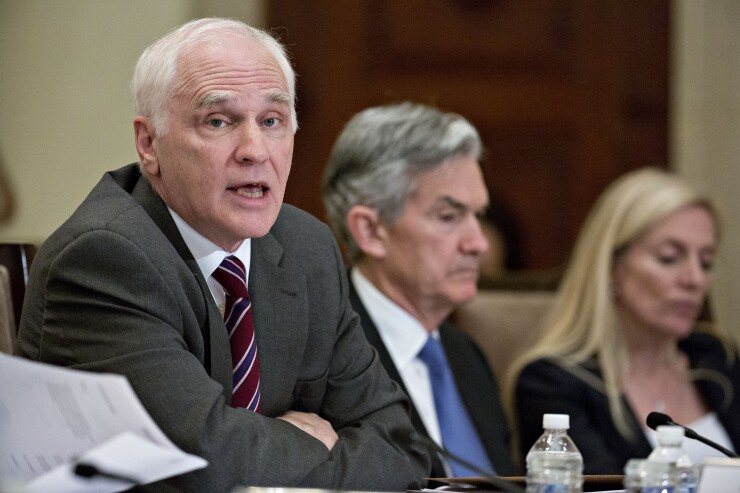WASHINGTON – The Federal Reserve Board should continue to focus on emerging systemic threats and work on exempting community banks from rules clearly aimed at larger institutions, said Fed Gov. Daniel Tarullo, who unexpectedly announced his pending departure Friday.
In an interview, Tarullo, who has served for eight years as the de facto head of banking supervision at the central bank, said after a "substantial run," it was time to step aside, acknowledging that the "job gets wearing over time."
"Personally, there comes a point where you say, ‘OK, I’ve worked successfully with some people to achieve some common goals and now it’s time to turn to something else," he said. "If you look at my resume, you see that I’m not one of those people who get an appointment and stays for 30 years.”
The decision wasn't a complete surprise, given that President Trump is expected to nominate a vice chairman of banking supervision soon. That could have sidelined Tarullo, though his board term would have allowed him to stay on at the central bank until 2022.

Tarullo, whose resignation is effective April 5, said some within and without the Fed system had asked him to stay on, but "there comes a point where I want to do something different."
"I think people who know the board understand that the staff and my colleagues here have done a lot of work, we’ve all done this together, and they’re going to be here," he said.
Tarullo said that he hasn't decided exactly what his next move is but that expects to return to teaching. He was previously an economics professor at Georgetown University Law Center before being asked by then-Sen. Barack Obama to advise his presidential campaign. Tarullo was nominated and confirmed for the Fed post in 2009.
Since that time, he served as the Fed's point person on regulatory matters and is widely credited will being the driving force behind its post-crisis regulatory framework and a key architect of the international Basel Committee rules.
Asked what remains left for the Fed to focus on, Tarullo cited focusing on dangers that continue to lurk in the system as it adapts and changes as well as crafting exceptions for community banks so they do not bear the burden of rules meant for far larger institutions.
“You want to see if there is runnable funding in other parts of the system," he said. "That’s never done, because financial markets adapt and create new markets and funding streams all the time."
Tarullo has lobbied for greater refining of rules so that community banks are not caught up in them. He has also sought to raise the threshold for facing rules aimed at curbing systemic risk, which is currently set at $50 billion of assets.
"I do think refining and tailoring what has already been done in the wake of experience is an important agenda item," he said. "I would like to see more progress in getting a truly simple capital system applicable to community banks and them alone. There’s more tailoring we can do.”
The impact of Tarullo's departure is sizable. For one, his resignation opens the door for Trump to possibly nominate more unconventional people to fill the vacancies on the central bank’s board of governors.
“That frees up Donald Trump’s ability to appoint people who don’t care two whits about the Federal Reserve or the Fed’s independence or its regulatory practices, but care a lot about Donald Trump,” said Peter Conti-Brown, professor of economics at the University of Pennsylvania Wharton School of Business.
His resignation was also lamented by many Wall Street reform advocates. Dennis Kelleher, president of Better Markets, said in a statement that Tarullo has been a “fearless fighter for protecting the American people from an unstable financial system” and that citizens “will be forever in his debt.”
“Using robust data, rigorous analysis and compelling arguments to rebut baseless, if not fraudulent, self-serving claims from Wall Street, Governor Tarullo has stood steadfast as a sentinel on the front lines of a six-year war to turn the Dodd-Frank financial reform law into a reality,” Kelleher said.
Shawn Sebastian, co-director of the Fed Up campaign, similarly lauded Tarullo and said that without him steering the Fed’s regulatory agenda “working people are the ones who will be hurt the most.” Sebastian called on members of the Senate to reject any nomination by President Trump that does not uphold a similar standard of economic protection for vulnerable populations.
“There will be three out of seven vacancies at the Board of Governors, leaving an opportunity for Trump to fill the spots with his Wall Street cronies and dealing a devastating blow to the economy-stabilizing role of the Board of Governors,” Sebastian said. “The Senate should not confirm any nominee for the Vice Chair for Supervision position who is not willing to continue Tarullo's work reining in Wall Street.”
But Jaret Seiberg, managing director of Cowen Group, said the future direction of the Fed’s regulatory policies was always going to be in the hands of whomever Trump picked to be the vice chairman of supervision, so Tarullo’s resignation ultimately does not change much in the near term. And since the Fed does not regulate banks alone, any broad change in direction won’t take place until replacements have been named at the Federal Deposit Insurance Corp. and Office of the Comptroller of the Currency, he said.
“The government's future approach to bank capital has always been dependent upon whom President Trump nominated to be vice chairman for supervision, Comptroller of the Currency and FDIC chairman,” Seiberg said. “All those nominations should come over the next 12 months. And those picks will decide whether the mega banks are treated better or worse.”
Ian Katz, director of Capital Alpha Partners, said Tarullo’s resignation was not necessarily a surprise, but its timing was unexpected and will hand Trump an almost unprecedented opportunity to shape the direction of the central bank.
“Tarullo was the most consequential figure in financial regulation in the Dodd-Frank era, and we can’t even think of who would be in second place,” Katz said. “The immediate impact is that Trump now has three Fed board seats to fill. He will be making a huge mark on the Fed.”
Who exactly Trump nominates to the vacant positions is unclear, though Katz said that with the expected confirmation of Steven Mnuchin to head Treasury this weekend, picks for the Fed will likely follow soon thereafter. Among the candidates being considered are GE Energy Financial Services CEO David Nason; Rep. French Hill, R-Ark.; former Comptroller of the Currency John Dugan; FDIC Vice Chairman Thomas Hoenig; former BB&T CEO John Allison; and banking attorney Randy Guynn.
Brian Gardner, policy analyst at Keefe, Bruyette & Woods, said Fed Chair Janet Yellen will still have some room to direct regulatory policy to the extent she chooses for the remaining year of her chairmanship, but with three new Trump nominees, “she will be effectively blocked from finishing outstanding rules like the net stable funding ratio.”
“Eventually, the Trump administration will have a majority on the Fed's board, but that will take some time and the chairman sets the regulatory agenda,” Gardner said. “So if Yellen wants to slow-walk regulatory changes that might be included in the Treasury secretary's report that was mandated in last Friday's executive order, then she will be able to do so.”





